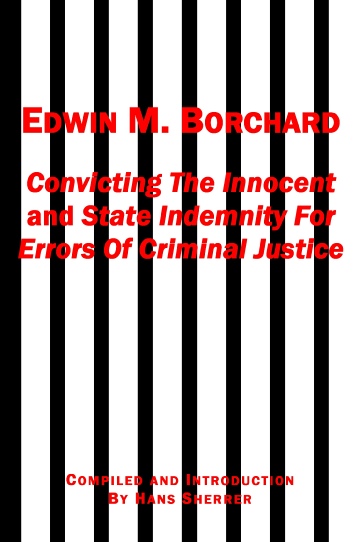Forejustice
Table of Contents
Introduction
Chapter 1. Edwin M. Borchard: Pioneer In Analyzing Wrongful Convictions And Advocate For Compensation
Chapter 2. Edwin Borchard, Law Expert, Dead
Chapter 3. European Systems Of State Indemnity For Errors Of Criminal Justice
Chapter 4. Convicting The Innocent: Sixty-

Click Here To Order from Amazon.com,
Edwin M. Borchard, Compiled and Introduction
available to as many people as possible, Click Here to read it in PDF at no charge.
Edwin M. Borchard:
Convicting The Innocent and State indemnity For Errors Of Criminal Justice
By Hans Sherrer
Introduction
Edwin Montefiore Borchard was honored in 2007 by Justice Denied—the magazine for the wrongly convicted, as an inaugural member of its Wrongful Conviction Hall of Honor that publicly recognizes the extraordinary contribution deserving people in the United States and other countries have made to rectifying, alleviating, or publicizing wrongful convictions. Justice Denied’s 2007 article about Borchard is included herein as Chapter 1.
Borchard’s interest in wrongful convictions and compensation for persons exonerated of their convicted crimes resulted in him authoring in 1913, European Systems Of State Indemnity For Errors of Criminal Justice, included herein as Chapter 3, and in 1932, Convicting The Innocent: Sixty-
Convicting the Innocent has not lost its luster as one of the most insightful books published on the topic of wrongful convictions. Seventy-
One hundred years after Borchard’s article about indemnifying wrongly convicted persons, one can surmise he would be pleased the federal government and the majority of states have enacted legislation financially compensating persons deemed to meet the applicable statute’s definition of a wronged person. However, it seems likely Borchard would be dismayed that only one state – Texas, which provides a lump sum payment of $80,000 per year of wrongful imprisonment and a generous lifetime annuity – has a system that fairly determines an exonerated person’s eligibility and then adequately compensates that person. As Borchard explains in his 1913 article (Chapter 3), many European countries were more advanced in providing indemnification 100 years and more ago, than is the norm in the United States in 2013. That is still true, except it doesn’t just apply to European countries, because in the “U.S. policy and legislation to ensure the right to compensation for wrongful conviction is among the poorest in the world.” A significant portion of Borchard’s article concerns the history of indemnifying wrongful convictions, which puts the current concerns about state and federal indemnification in the perspective that it is an issue that has been debated for centuries.
Of topical importance in a post-
Borchard was a professor at the Yale Law School for 33 years (1917-
Edwin Borchard’s national notoriety was such that when he died on July 22, 1951 at the age of 66, the New York Times published an 18 paragraph, 740 word Obituary. Borchard’s New York Times Obituary is included herein as Chapter 2.
Borchard was the first consistent voice in this country for innocent people enmeshed in the legal system. So it is important that it be remembered his works laid the foundation for today’s advocates for wrongly convicted persons, and the encouragement of public policies that may prevent wrongful convictions and ensure adequate indemnification when they occur.
Given the legal system’s inertia and resistance to meaningful reforms, it may well be that Borchard’s analysis of the causes of wrongful convictions and the general inadequacy of indemnification for exonerated persons will be as relevant many decades from now as it is today.
Published July 2013
Forejustice Copyright 2002-